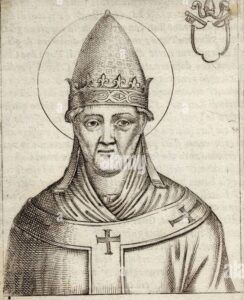Born in 285 AD, Pope Sylvester I served as pope and died in Rome, Italy, on December 31, 335 AD, at the age of 50.
His feast day is celebrated on December 31, and he was canonized in the Pre-Congregation period.
He is the patron saint of Feroleto Antico, the Sylvestrine Benedictines, Nonantola, and other popes named Sylvester.
| St Sylvester I, Pope Biography | |
|---|---|
 |
|
| Date of Birth | 285 AD |
| Profession | Pope |
| Place of Death | Rome, Italy |
| Date of Death | December 31 335 (aged 50) |
| Feast Day | December 31 |
| Canonization | Pre-Congregation |
| Patron Saint of |
|
St Sylvester I, Pope Life History
St Sylvester I, though a somewhat enigmatic figure in history, holds a prominent place in the early Church as one of the first popes to witness Christianity’s transformation from a persecuted faith to an accepted religion within the Roman Empire.
Sylvester succeeded the papacy in 314 AD, a year after Emperor Constantine’s military triumph and the issuance of the Edict of Milan, which marked a pivotal turn in Christian history by formally granting tolerance to Christians.
While Constantine did not make Christianity the Empire’s official religion (this would not happen until 380 AD), his actions gave the Church newfound freedom and security to worship openly, expanding its influence throughout Roman society.
Under Pope Sylvester’s leadership, the Church experienced a profound period of growth and visibility.
For the first time, Christians emerged from the seclusion of hidden house churches and into the grand spaces of basilicas, celebrating their faith publicly.
Processions filled the streets, statues were erected, and a new Christian calendar took root, with sermons preached openly and clergy proudly guiding a newly liberated congregation.
Sylvester oversaw the establishment of many basilicas in Rome, including the Church of St. John Lateran and the original St. Peter’s Basilica, which became enduring symbols of the Church’s presence and legacy.
Sylvester’s guidance during this delicate transition from pagan to Christian Rome is believed to have required a steady and balanced hand.
He was likely a prudent leader, avoiding missteps that could have hindered Christianity’s spread across the Empire.
His efforts helped lay the foundation for the Church to become a central institution within Roman society, eventually overshadowing the authority of the Empire itself.
As pagan Rome transformed into a Christian stronghold, Sylvester and his successors navigated this evolving landscape with skill, leading the Church into a new era of acceptance and prominence.
Related Links
Powered By SEO Experts
Follow @ReadingCatholic
